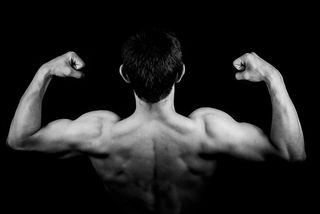Health
Why No One Should Have to “Take It Like a Man”
Many men work hard to keep their emotions inside—but it's very unhealthy.
Posted November 22, 2019 Reviewed by Jessica Schrader
If you’ve ever been told to “take it like a man”—whether or not you identify as male—you’ll understand that being “manly” in this stereotypical way means keeping your feelings to yourself. It means staying quiet about pain or discomfort, either physical or emotional. “Man up,” some people will say. If you don’t, they may look askance at you, or judge you harshly.
Some writers, like the University of Michigan professor Phil Christman, construe "acting like a man” as tolerating pain for its own sake or even seeking out uncomfortable situations (such as intense weight-lifting or living in a poorly provisioned apartment) for the express purpose of stoically enduring them. Seen this way, men seem to be working awfully hard to quash any unpleasant feelings, simply because they’re expected to.
As the American Psychological Association recently pointed out, men in our culture receive powerful, stereotypical instructions about the obligatory performance of their masculinity. They're expected to be strong, aloof, emotionally insensitive, and self-sufficient to the point of self-sacrifice—as reported in the journal Nursing Inquiry. (And who would know better about negative male stereotypes than male nurses—a group of guys dedicated to a physically grueling, emotionally overwhelming, cognitively demanding profession, who nevertheless may be looked upon with skepticism or disdain simply because they work under the title “nurse”?)

When bringing up this topic, it's important to acknowledge the giant, long-lived elephant—the mastodon, perhaps?—in the room: The way psychological theories have, for many decades, been written about white men of European origin and have certainly redounded to their benefit. Even so, rigid adherence to antiquated norms for maleness can be detrimental to a man’s health—indeed, to the health of anyone at all. Keeping one's feelings inside amounts to “suppressed affect,” the habitual practice of which—according to Wizdom Powell, a professor at the University of Carolina at Chapel Hill—often leads to negative consequences for one's health.
To understand it, you might imagine emotional tension to be a form of pressure in a constrained system: Even if it can be tamped down in one place, it will pop out destructively somewhere else. Men who try to suppress their feelings will likely experience this effect, as one negative emotion may be substituted for another. Instead of allowing themselves to remain open to unpleasant or vulnerable emotions, like guilt, shame, or sadness, they’ll often resort to anger, instead.
And perhaps this propensity toward anger is why American men commit 90 percent of the homicides in this country (as reported by the APA). Men in the USA have a shorter life expectancy than women, overall: Other, more specific studies have found that the expectations of maleness in our culture can lead to risky behavior. Such risk-taking has been attributed to the style in which American men are gender-socialized: A study in Social Science and Medicine found that the more men adhered to the norms of traditional or “toxic" masculinity, the more often they put their health at risk by smoking, drinking heavily, and shunning healthy foods.
Toxic masculinity has been linked to cirrhosis of the liver, sexually transmitted diseases, like HIV, and cancer, as noted in the Trends & Urology & Men’s Health journal. Similarly, New Male Studies reported that men who believe wholeheartedly in traditional masculine ideals are more likely to experience shame about negative sexual experiences and that these feelings of shame are likely to lead to the symptoms of depression. All told, statistics suggest that while men may not be talking about their feelings, they are acting out these feelings in ways that are often dangerous to their health.

Worse, the values of “toxic masculinity” enact an even more insidious effect: that of cutting people off from potential sources of social support. If a man who is depressed feels he must act “macho” by hiding his emotions, he will likely deny himself the opportunity to rely on a friend, partner, or family member who cares about him (again, according to Wizdom Powell).
This holds true for mental health or medical care, too: The journal Psychology of Men & Masculinity reported that the men who subscribe to these traditional values are also the ones least likely to seek out mental health services, and in the Journal of Health and Social Behavior, the same was found to be true of men who needed but did not obtain preventive health care.
And this doesn’t even account for the interactions between masculine ideals, race, and income. Wizdom Powell, on the aforementioned APA podcast, explains that men who strive to seem powerful but have been denied the chance to achieve such power through financial opportunity or income may feel the pressure to act like men in other, less healthy ways. Social challenges, like microaggressions—the subtle, everyday challenge of societal racism—can also force men with traditional values to act aggressively, or in other self-damaging but “masculine” ways, as a means of reclaiming some pride or self-respect. Then, of course, they are unable to express the pain caused by such microaggressions because of the cultural forces promoting stoicism, and their stress reaction may become even more significant.
Among African-American men, the phrase "John Henryism" refers to an effortful coping style that relies on projected strength, silence, and suffering in the face of oppression; the Journal of Black Psychology indicates that this style of coping is associated with clinical depression and high blood pressure. Just as well, older men may also be at risk for masculinity-related mental health problems, such as depression. Adherence to traditional or "toxic" ideals may make it difficult for men of retirement age to accept the loss of status, daily purpose, or income inherent in making the transition from employment to retirement (as reported by Health Services Research).
Given the above, it seems as though American masculinity is ripe for a cultural sea change, in which our men begin to gain comfort with disclosing vulnerability and accepting help, without the fear of being labeled a “wimp” (as a patient of mine recently worried aloud). Therapy, of course, may be of help. In January of 2019, the APA released a set of guidelines for practicing psychotherapy with men and boys, drawing on a substantial body of research on the malign effects of toxic masculinity. As the APA has stated, socializing men and boys to be competitive, dominating, and aggressive, and to suppress their more vulnerable emotions, is plainly harmful.
Many men in our culture are constrained by the roles in which they find themselves (even as these roles simultaneously convey distinct advantages). Psychotherapists who work with men must recognize the ways that their patients may be internalizing their emotions, acting them out, or venting them as anger, rather than expressing them straightforwardly. There are still some positive and prosocial aspects of the traditional masculine style, such as the assumptions of bravery or willingness to lead; in the future, male, female, and other Americans would do well to strive toward these aspects of the traditional masculine ideal, while also showing the flexibility, insight, and openness to emotion that could characterize the masculinity of our future.
References
American Psychological Association (2018). APA Guidelines for psychological practice with boys and men. Retrieved from https://www.apa.org/about/policy/boys-men-practice-guidelines.pdf.
Christman, P. (2018, July 30). What is it like to be a man?. Retrieved from https://getpocket.com/explore/item/what-is-it-like-to-be-a-man?utm_sour…
Curtin, S. C, Warner, M; & Hedegaard, H. Suicide Rates for Females and Males by Race and Ethnicity: United States, 1999 and 2014. CDC Office of Analysis and Epidemiology, April 2016. https://www.cdc.gov/nchs/data/hestat/suicide/rates_1999_2014.pdf
Doshi, J.A., Cen, L, & Polsky, D. (2008). Depression and retirement in late middle-aged U.S. workers. Health Services Research, 43(2): 693–713.
Gordon, A.M. (2019). Male sexual shame, masculinity, and mental health. New Male Studies 8(1), 1–24
Hamilton, A. (Host). (2016, June 10). Speaking of psychology [Audio podcast]. Retrieved from https://www.apa.org/research/action/speaking-of-psychology/men-boys-hea…
Hudson, D. L., Neighbors, H. W., Geronimus, A. T., & Jackson, J S. (2016). Racial discrimination, John Henryism, and depression among African-Americans. Journal of Black Psychology, 42(3): 221–243.
Kirby, R., & Kirby, M. (2019) The perils of toxic masculinity: Four case studies. Trends in Urology & Men’s Health, 10(5), 18-20
Mahalik, J.R., Burns, S.M., & Syzdek, M. (2007). Masculinity and perceived normative health behaviors as predictors of men's health behaviors. Social Science and Medicine, 64(11), 2201-2209.
Pappas, S. (2019, January). APA issues first-ever guidelines for practice with men and boys. Retrieved from https://www.apa.org/monitor/2019/01/ce-corner
Wall, D., & Kristjanson. L. (2005). Men, culture, and hegemonic masculinity: understanding the experience of prostate cancer. Nursing Inquiry, 12, 97-97. doi: doi-org.ezproxy.rit.edu/10.1111.j.1440-1800.2005.00258.x.
Yousaf, Omar & Popat, Aneka & Hunter, Myra. (2014). An investigation of masculinity attitudes, gender, and attitudes toward psychological help-seeking. Psychology of Men & Masculinity. 16(2), 10-18.




